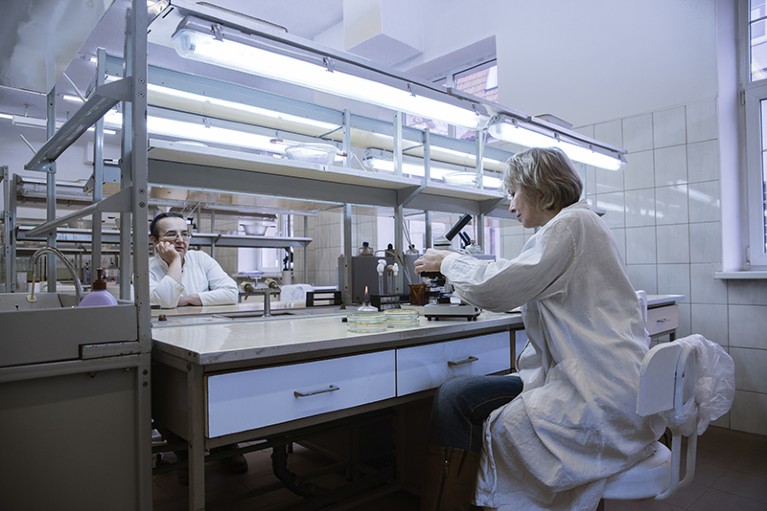
All institutions must take a firm line and stamp out bullying.Credit: Alex Potemkin/iStock/Getty
Picture the scene: You are an enthusiastic young scientist, with, you think, the world at your feet. You have an exciting offer to join a world-leading research institute in another country. And then, to your dismay, you find yourself in a workplace where everything feels wrong. Your supervisor intimidates you and you receive upsetting e-mails, but the institute leadership seems indifferent. You are alone in a foreign culture, and you don’t know what to do. Your friends tell you to complain, but you are afraid of repercussions — and of losing the opportunity you fought so hard for. And, anyway, you don’t know who to trust.
This has apparently been the situation for years for some young researchers at the Max Planck Institute for Astrophysics in Garching, Germany. Details of their struggles with alleged bullying by one of the directors — Guinevere Kauffmann — erupted in the media in the past two weeks.
According to the allegations, problems at the institute have simmered for years. The institute put in place coaching and monitoring for Kauffmann, who says: “I believe I have modified my behaviour very substantially in the last 18 months since the complaints were made.” The institute also circulated an anonymous survey to young researchers, asking whether they think the problems are continuing and whether they have enough support. The results are to be presented to the institute this week, but, according to a leaked copy of the report, they show three fresh allegations of bullying against current staff, although it is not known against whom. The institute says it is investigating.
In Nature’s opinion, young researchers there have been let down over the years. These researchers say the institute and its parent body, the Max Planck Society — also one of the world’s leading research organizations — failed to control the situation in a timely manner. It is hard to disagree.
Most scientific institutions in Germany — including the Max Planck Society — already have formal procedures in place to deal with misconduct in the lab. These focus mainly on plagiarism, fabrication and falsification. But they usually also include an ombudsman system — a supposedly independent figure who can hear complaints and weigh in. Students and staff should be able to raise allegations of bullying in this way. In this specific case, this didn’t happen. Young scientists who say they were bullied found the system inadequate because no one to whom they could complain within the Max Planck system seemed to them to be truly independent. The Max Planck Institute for Astrophysics says it is already revising its code of conduct and making sure its internal mechanisms for addressing concerns are accessible. The Max Planck Society says that it will also look at the way it deals with allegations of inappropriate behaviour. It should do so urgently.
A key relationship in science is that between student and supervisor, in which the student is often entirely dependent on the supervisor and that person’s support to progress in their career. Students embarking on postgraduate or postdoc years are sometimes unprepared for the demands that are placed on them. And many supervisors have only their own experiences to draw on. It’s possible that what a supervisor views as firm direction or lively banter crosses the line into bullying and abuse.
Institutions will argue — correctly — that allegations must be addressed with due process, typically with a need for confidentiality. That can and does take time. But rapid protection for those who may be suffering and, more generally, the protection of vulnerable young employees at the start of their careers must take precedence.
The issue of sexual harassment in science has received overdue and welcome attention recently, and most observers believe the high-profile cases reported so far are the tip of an iceberg. Could bullying be equally prevalent? The data are not yet there, but it is telling that of the 300-plus responses sent in relation to a recent Editorial about poor postgraduate mental health, a significant number highlighted a dysfunctional — or worse — relationship with their supervisor.
We will never know how many promising scientific careers around the world have been brought to a premature end because young researchers felt they could not continue to work under a bullying senior figure. But it should stop. Now. Those affected must be shown that the system will protect them if they choose to speak out. Institutions should ensure they have explicit policies in place for dealing with bullying, and, as part of that, define what constitutes bullying. And senior scientists who see colleagues behave in an inappropriate way should speak out.

 Germany’s prestigious Max Planck Society investigates new allegations of abuse
Germany’s prestigious Max Planck Society investigates new allegations of abuse
 Max Planck astrophysicist at centre of bullying allegations speaks up
Max Planck astrophysicist at centre of bullying allegations speaks up
 Max Planck scientists criticize handling of animal-rights charges against leading neuroscientist
Max Planck scientists criticize handling of animal-rights charges against leading neuroscientist





